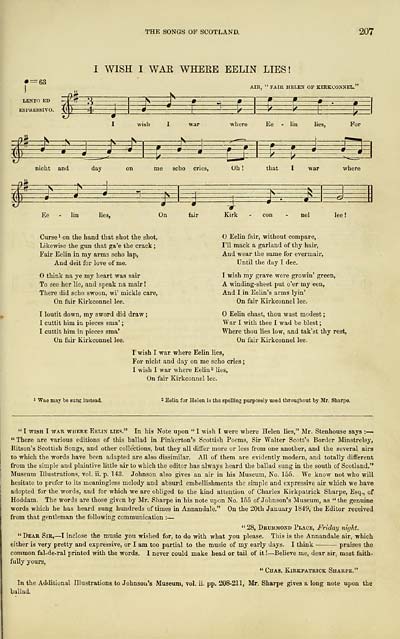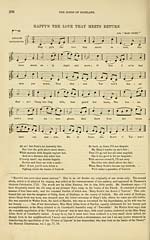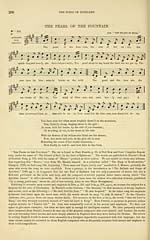Glen Collection of printed music > Printed music > Wood's edition of the songs of Scotland
(233) Page 207 - I wish I war where Eelin lies
Download files
Complete book:
Individual page:
Thumbnail gallery: Grid view | List view

THE SONGS OF SCOTLAND.
207
• = 63
ESPKESSIVO. \ (\) 4 1
$
I WISH I WAR WHERE EELIN LIES!
AIR, " FAIR HELEN OF KIRKCONNEL."
-a-
~0-
I
£
wish
where
Ee - lin
lies,
For
Ee
lin
lies,
On
fair
Kirk
nel
rttt
\ \.
\
. . .
y%
[> \
\
_ . JV L
i-
-
a
A
j ..-.;<■
m
1 ■ m -
(\\
- m t
m
w
w *
•■
\j
1 "■
" *
\s\>
•
1
V
/
'/
nieht and day
». 1
on
me scho cries,
Uh!
that
I war
where
rtt
\ \
■£?-
T J J
3
v —
\—
^
m
1 1
*—
<S
o
d
•
■J-
lee!
Curse ' on the hand that shot the shot,
Likewise the gun that ga'e the crack ;
Fair Eelin in my arms scho lap,
And deit for love of me.
think na ye my heart was sair
To see her lie, and speak na mair !
There did scho swoon, wi' mickle care,
On fair Kirkconnel lee.
1 loutit down, my sword did draw ;
I cuttit him in pieces sua' ;
I cuttit him in pieces sma'
On fair Kirkconnel lee.
Eelin fair, without compare,
I'll mack a garland of thy hair,
And wear the same for evermair,
Until the day I dee.
1 wish my grave were growin' green,
A winding-sheet put o'er my een,
And I in Eelin's arms lyin'
On fair Kirkconnel lee.
O Eelin chast, thou wast modest ;
War I with thee I wad be blest ;
Where thou lies low, and tak'st thy rest,
On fair Kirkconnel lee.
I wish I war where Eelin lies,
For nicht and day on me scho cries ;
I wish I war where Eelin 2 lies,
On fair Kirkconnel lee.
1 Wae may be sung instead.
! Eelin for Helen is the spelling purposely used throughout by Mr. Sharpe.
" I wish I war wuere Eelin lies." In his Note upon " I wish I were where Helen lies," Mr. Stenhouse says : —
" There are various editions of this ballad in Pinkerton's Scottish Poems, Sir Walter Scott's Border Minstrelsy,
Kitson's Scottish Songs, and other collections, but they all differ more or less from one another, and the several airs
to which the words have been adapted are also dissimilar. All of them are evidently modern, and totally different
from the simple and plaintive little air to which the editor has always heard the ballad sung in the south of Scotland."
Museum Illustrations, vol. ii. p. 143. Johnson also gives an air in his Museum, No. 155. We know not who will
hesitate to prefer to its meaningless melody and absurd embellishments the simple and expressive air which we have
adopted for the words, and for which we are obliged to the kind attention of Charles Kirkpatrick Sharpe, Esq., of
Hoddam. The words are those given by Mr. Sharpe in his note upon No. 155 of Johnson's Museum, as " the genuine
words which he has heard sung hundreds of times in Annandale." On the 20th January 1849, the Editor received
from that gentleman the following communication : —
" 28, Drummond Place, Friday night.
" Dear Sir, — I inclose the music you wished for, to do with what you please. This is the Annandale air, which
either is very pretty and expressive, or I am too partial to the music of my early days. I think praises the
common fal-de-ral printed with the words. I never could make head or tail of it ! — Believe me, dear sir, most faith-
fully yours,
" Chas. Kirkpatrick Sharpe."
In the Additional Illustrations to Johnson's Museum, vol. ii. pp. 208-211, Mr. Sharpe gives a long note upon the
ballad.
207
• = 63
ESPKESSIVO. \ (\) 4 1
$
I WISH I WAR WHERE EELIN LIES!
AIR, " FAIR HELEN OF KIRKCONNEL."
-a-
~0-
I
£
wish
where
Ee - lin
lies,
For
Ee
lin
lies,
On
fair
Kirk
nel
rttt
\ \.
\
. . .
y%
[> \
\
_ . JV L
i-
-
a
A
j ..-.;<■
m
1 ■ m -
(\\
- m t
m
w
w *
•■
\j
1 "■
" *
\s\>
•
1
V
/
'/
nieht and day
». 1
on
me scho cries,
Uh!
that
I war
where
rtt
\ \
■£?-
T J J
3
v —
\—
^
m
1 1
*—
<S
o
d
•
■J-
lee!
Curse ' on the hand that shot the shot,
Likewise the gun that ga'e the crack ;
Fair Eelin in my arms scho lap,
And deit for love of me.
think na ye my heart was sair
To see her lie, and speak na mair !
There did scho swoon, wi' mickle care,
On fair Kirkconnel lee.
1 loutit down, my sword did draw ;
I cuttit him in pieces sua' ;
I cuttit him in pieces sma'
On fair Kirkconnel lee.
Eelin fair, without compare,
I'll mack a garland of thy hair,
And wear the same for evermair,
Until the day I dee.
1 wish my grave were growin' green,
A winding-sheet put o'er my een,
And I in Eelin's arms lyin'
On fair Kirkconnel lee.
O Eelin chast, thou wast modest ;
War I with thee I wad be blest ;
Where thou lies low, and tak'st thy rest,
On fair Kirkconnel lee.
I wish I war where Eelin lies,
For nicht and day on me scho cries ;
I wish I war where Eelin 2 lies,
On fair Kirkconnel lee.
1 Wae may be sung instead.
! Eelin for Helen is the spelling purposely used throughout by Mr. Sharpe.
" I wish I war wuere Eelin lies." In his Note upon " I wish I were where Helen lies," Mr. Stenhouse says : —
" There are various editions of this ballad in Pinkerton's Scottish Poems, Sir Walter Scott's Border Minstrelsy,
Kitson's Scottish Songs, and other collections, but they all differ more or less from one another, and the several airs
to which the words have been adapted are also dissimilar. All of them are evidently modern, and totally different
from the simple and plaintive little air to which the editor has always heard the ballad sung in the south of Scotland."
Museum Illustrations, vol. ii. p. 143. Johnson also gives an air in his Museum, No. 155. We know not who will
hesitate to prefer to its meaningless melody and absurd embellishments the simple and expressive air which we have
adopted for the words, and for which we are obliged to the kind attention of Charles Kirkpatrick Sharpe, Esq., of
Hoddam. The words are those given by Mr. Sharpe in his note upon No. 155 of Johnson's Museum, as " the genuine
words which he has heard sung hundreds of times in Annandale." On the 20th January 1849, the Editor received
from that gentleman the following communication : —
" 28, Drummond Place, Friday night.
" Dear Sir, — I inclose the music you wished for, to do with what you please. This is the Annandale air, which
either is very pretty and expressive, or I am too partial to the music of my early days. I think praises the
common fal-de-ral printed with the words. I never could make head or tail of it ! — Believe me, dear sir, most faith-
fully yours,
" Chas. Kirkpatrick Sharpe."
In the Additional Illustrations to Johnson's Museum, vol. ii. pp. 208-211, Mr. Sharpe gives a long note upon the
ballad.
Set display mode to: Large image | Transcription
Images and transcriptions on this page, including medium image downloads, may be used under the Creative Commons Attribution 4.0 International Licence unless otherwise stated. ![]()
| Special collections of printed music > Glen Collection of printed music > Printed music > Wood's edition of the songs of Scotland > (233) Page 207 - I wish I war where Eelin lies |
|---|
| Permanent URL | https://digital.nls.uk/91340539 |
|---|
| Description | Scottish songs and music of the 18th and early 19th centuries, including music for the Highland bagpipe. These are selected items from the collection of John Glen (1833 to 1904). Also includes a few manuscripts, some treatises, and other books on the subject. |
|---|
| Description | The Glen Collection and the Inglis Collection represent mainly 18th and 19th century Scottish music, including Scottish songs. The collections of Berlioz and Verdi collected by bibliographer Cecil Hopkinson contain contemporary and later editions of the works of the two composers Berlioz and Verdi. |
|---|

